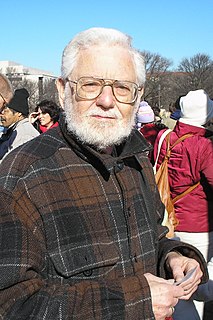A Quote by U.G. Krishnamurti
I am not anti-rational, just unrational. You may infer a rational meaning in what I say or do, but it is your doing, not mine.
Related Quotes
I want to say, and this is very important: at the end we lucked out. It was luck that prevented nuclear war. We came that close to nuclear war at the end. Rational individuals: Kennedy was rational; Khrushchev was rational; Castro was rational. Rational individuals came that close to total destruction of their societies. And that danger exists today.
If the Humanists wish to be champions of reason, they should consider the following: just as they would not admit mystics into their camp, since no rational discussion is possible with men who substitute supernatural revelations for rational evidence-so they cannot admit advocates of force into their camp, because no rational discussion or agreement is possible with men who substitute guns for rational persuasion.
You get your intuition back when you make space for it, when you stop the chattering of the rational mind. The rational mind doesn't nourish you. You assume that it gives you the truth, because the rational mind is the golden calf that this culture worships, but this is not true. Rationality squeezes out much that is rich and juicy and fascinating.
It's all emotion. But there's nothing wrong with emotion. When we are in love, we are not rational; we are emotional. When we are on vacation, we are not rational; we are emotional. When we are happy, we are not [rational]. In fact, in more cases than not, when we are rational, we're actually unhappy. Emotion is good; passion is good. Being into what we're into, provided that it's a healthy pursuit, it's a good thing.
Raymond Aron ascribes to Weber the view that 'each man's conscience is irrefutable.' ... while [Weber] holds that an agent may be more or less rational in acting consistently with his values, the choice of any one particular evaluative stance or commitment can be no more rational than any other. All faiths and all evaluations are equally non-rational.
If I make a stupid decision but don't execute it because I'm, say, lazy, then I'm lucky, not rational. However, at other times a person acts for good reasons just as she does what she thinks she shouldn't do, not knowing that they are good reasons. Just like sometimes we are a lot less rational than we think we are, it is also true that sometimes we are a lot more rational than we think we are.
When you look at any experimental work not directly related to economics, but trying to test rational behavior in other ways, experiments have conspicuously failed to show rational behavior. Macro evidence certainly suggests deviations from rationality, but I don't want to say the rationality hypothesis is completely wrong. If you have any introspective idea or experimental idea about people's behavior, it seems to be incompatible with the really full scale rational expectations.



































